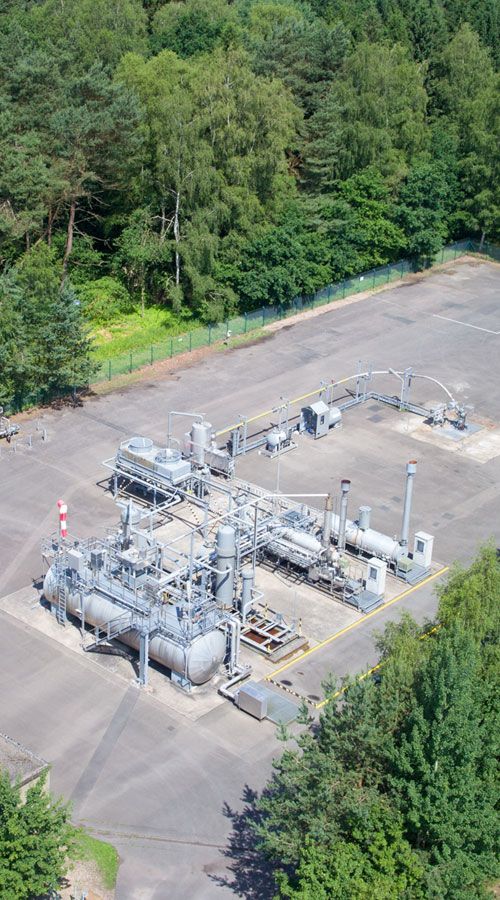Response to tremors


-
Two discernible tremors on 20 November caused damage to buildings
-
Wintershall Dea settles damage promptly and unbureaucratically
-
Production from natural gas field Völkersen/Völkersen-North will not be further expanded
Wintershall Dea is responding to two discernible tremors in the Verden district on 20 November by pledging that damage after the two short tremors will be compensated for quickly and unbureaucratically. At the same time, the company announced that it would not expand production from the natural gas field Völkersen/Völkersen-North further, meaning output there will fall successively in the coming years. Tremors that might cause structural damage to buildings on the surface and so affect their safety are not anticipated. As an additional measure, Wintershall Dea will expand its seismic monitoring network and intensify its accompanying scientific support.
“We are very sorry that uncertainty and damage has been caused in the Verden district as a result of gas production,” said Dirk Warzecha, Head of Wintershall Dea’s Business Unit Germany. “We at Wintershall Dea apply the very highest standards in all we do and assume responsibility,” added Warzecha.
Since the morning after the two tremors, experienced employees from Wintershall Dea have been on site, recording reports of damage, assessing the damage on the spot and awarding compensation for it. “Damage must be remedied quickly and unbureaucratically,” said the Head of Wintershall Dea’s Business Unit Germany.
Two discernible tremors occurred in the Verden/Aller region on 20 November. Both could be felt in particular by citizens located north-east of the town.
An initial assessment of the special measurement devices concludes that the tremors at the surface led to vibrations of 2.1 (6.30 p.m.) and 5.1 millimetres/second (10.30 p.m.). These devices were already installed several years ago primarily in public buildings in the region and are operated by an independent service provider. The reservoir of the Völkersen natural gas field is located at a depth of some 5,000 metres, the origin of the tremors on 20 November.
Earth tremors are a rare concomitant phenomenon in gas production. They depend on the reservoir in question. The natural gas reservoir Völkersen is located at a depth of around 5,000 metres, below a mighty cap rock. Consequently, discernible earth tremors for the Völkersen gas field were not expected when production commenced there in 1992. Contrary to those expectations, however, tremors that are very likely attributable to gas production have occurred in the past.
“However, the fact that the Völkersen reservoir is located at 5,000 meters, and so at a depth that is huge compared to other natural gas fields, provides assurance that the impact of such tremors will remain modest. Tremors that might cause structural damage to buildings on the surface are not anticipated,” stated Warzecha: “We therefore believe, on the basis of the information currently available, that continued production of the already developed natural gas reserves in the Völkersen field is justifiable.”
As a response to the tremors on 20 November, however, the company has decided that it will not expand production from the natural gas field Völkersen/Völkersen-North further. Output from it will therefore fall successively. Production from natural gas wells is to be continued until the end of their lifecycle, after which they are to be shut down and recultivated. That means natural gas production will be reduced gradually and in a controlled manner.
“Our company acts responsibly and with all due deliberation,” said Warzecha: “We are committed to a solution-focused, continuous dialogue with residents and local politicians – coupled with independent scientific support and complete transparency.”
About Wintershall Dea
With the merger of Wintershall Holding GmbH and DEA Deutsche Erdoel AG, two successful companies with a long tradition have formed Europe’s leading independent natural gas and oil company: Wintershall Dea. The company with German roots and headquarters in Kassel and Hamburg explores for and produces gas and oil in 13 countries worldwide in an efficient and responsible manner. With activities in Europe, Russia, Latin America and the MENA region (Middle East & North Africa), Wintershall Dea has a global upstream portfolio and, with its participation in natural gas transport, is also active in the midstream business.
Wintershall Dea stands for more than 120 years of experience as an operator and project partner along the entire E&P value chain. The company employs around 4,000 people worldwide from over 60 nations. The company plans to increase its average daily production from about 590,000 barrels of oil equivalent in 2018 to about 750,000 boe/d by 2023.


